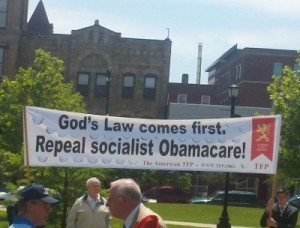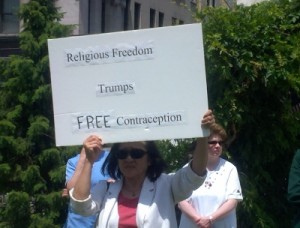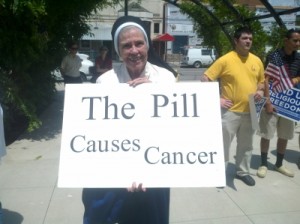
Religious individuals have special exemptions from law while non-religious individuals are compelled to comply with the Affordable Care Act healthcare mandate.
President Obama’s Affordable Care Act (ACA) legislation has been quite unpopular with many traditional/conservative religious individuals and organizations throughout 2012 and 2013 because of the ACA’s contraceptive mandate stipulating that people paying for healthcare, and employers providing healthcare, would be mandated to fund or provide a program which contains provisions contrary to their religious beliefs.
Some religious individuals — especially those who attended a Scranton, PA Stand Up For Religious Freedom rally I protested in mid-2012 –argued that the ACA’s contraceptive mandate in particular was a violation of individuals’ religious liberties and because of this, religious individuals should be exempt from being mandated to support the program — upon penalty or tax — or provide ACA coverage to employees.
The latest news concerning the ACA is that the Supreme Court of the United States granted a temporary exemption from the healthcare mandate to groups affiliated with the Catholic Church. In doing this, the Supreme Court has granted a special exemption allowing for religious individuals to be above the law simply because they profess religious beliefs although others who may have significant objections, no matter how sincere or strong, to the ACA must comply.

As a non-religious individual who holds significant objections to many of the United States’ military efforts, initiation of drone strikes which kill innocent people, the death penalty, the ‘war on drugs,’ high rates of incarceration for non-violent individuals, and many other policies, I cannot profess that — because of my secular beliefs which may fall under the umbrella of secular humanism — I should be exempt from paying taxes or otherwise supporting a program or policy I strongly disagree with and thus be exempt from paying a tax or supporting a policy or program.
The Supreme Court sends a message that simply because people profess a religious belief, they can be exempt from complying with law and may opt-out of supporting a policy or program while non-religious individuals, no matter how strong their convictions, may not opt-out.
In 2012, when I engaged in dialogue with religious individuals arguing that the ACA was a violation of religious liberties and that they should not be compelled — by penalty or tax — to support a policy they objected to, I asked why I, objecting to a United States-based policy or program on secular grounds, cannot opt-out. Why should I, a secular individual, be compelled to financially support a program or policy I strongly object to while religious individuals may be exempt?
 2014 begins on a sour note with religious individuals — because they profess strongly held religious beliefs — gaining special privileges in respect to the law while secular individuals, no matter how sincere or strong their beliefs, deserve less consideration. So much for ‘one law for all.’
2014 begins on a sour note with religious individuals — because they profess strongly held religious beliefs — gaining special privileges in respect to the law while secular individuals, no matter how sincere or strong their beliefs, deserve less consideration. So much for ‘one law for all.’
As always, feel free to comment below.